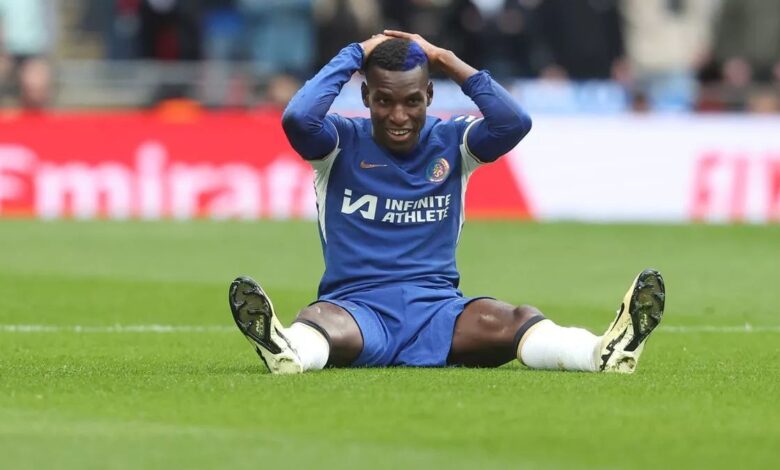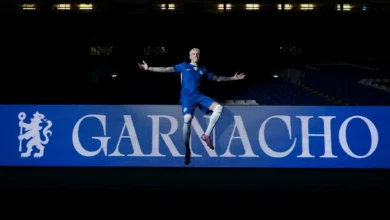
Chelsea fans throughout the winter transfer market monitored their club’s business with eager eyes, yearning for an announcement of an incoming striker.
The club had made bold moves in the summer, including signing João Félix, who has since left for AC Milan, and Renato Veiga, who has joined Juventus on loan. Another summer arrival was Marc Guiu, a low-risk signing from Barcelona, brought in to develop as an option for the future.
However, the winter window did not bring similar excitement. The deadline passed without Chelsea addressing what fans and pundits alike saw as a clear need—a proven striker. Mikel Obi, a former Chelsea player, publicly stated that Nicolas Jackson is still a work in progress and requires strong competition up front. Yet, the club did not blink.
Just days after the window shut, Chelsea’s decision was put to the test. Marc Guiu, now the primary backup to Jackson, suffered a major injury, while Jackson himself was ruled out with fitness concerns.
Speaking about the situation ahead of Chelsea’s FA Cup tie against Brighton, head coach Enzo Maresca admitted, “Marc Guiu is unfortunately injured, and it’s a big injury. Nico is progressing but is still a doubt for the next game.”
So, with limited options up front, was Chelsea wrong not to sign a striker in January?
Were Chelsea Wrong Not to Sign a Striker?
No, and This May Ruffle a Few Feathers—But Hear Us Out
The need for a new No. 9 is undeniable. However, history suggests that Chelsea’s best long-term strikers have rarely been signed in January.
Chelsea’s past forays into January striker signings have been underwhelming. Take Fernando Torres, who arrived from Liverpool in 2011 for £50 million—a record fee at the time. Expectations were sky-high, but the Spaniard struggled massively, managing just one league goal in his first 18 games. The mid-season transition, lack of preparation time, and pressure of an immediate impact proved too much.
This isn’t an isolated case. January signings often fail to settle quickly due to the lack of pre-season adaptation and the difficulty of learning new systems on the fly. Chelsea, under a new manager in Enzo Maresca, could not afford another failed gamble.
The winter window is also notoriously difficult for securing value deals. Clubs rarely want to lose their top players mid-season unless offered an overpriced sum. This was evident in Chelsea’s inability to land a suitable striker, as most targets were either unavailable or too expensive.
For example, Victor Osimhen, long admired by Chelsea, is currently on loan at Galatasaray from Napoli. His high wages complicated negotiations in the summer, and securing him in January would have been even tougher.
Similarly, Alexander Isak, who has been a dream target for clubs like Liverpool and Arsenal, would have been an ideal fit. However, Newcastle reportedly valued him at well over £120 million—a fee Chelsea would likely refuse to pay.
Simply put, Chelsea may have avoided a panic buy, a decision that could ultimately serve them well in the long run.
While not signing a striker in January might have been the right call, it doesn’t excuse the club’s long-term failure to properly address the position. Since the departure of Diego Costa, Chelsea have struggled to find a world-class centre-forward who can lead the line consistently.
The responsibility now falls on the ownership and sporting directors to identify top targets well before the summer window and ensure that Chelsea don’t enter another season with the same issue.
In the meantime, Chelsea will have to find alternative attacking solutions. Fortunately, Maresca remains calm about the situation. Asked about Chelsea’s striker options ahead of the FA Cup clash against Brighton, he responded:
“We can find some different solutions. At the moment, we didn’t decide anything because we are still waiting for Nico, and from there, we will see different options.”
He added: “We have players. Christo (Nkunku) has played already as a nine. I had Cole (Palmer) playing as a nine in the past [in Manchester City’s youth set-up].”
With Nkunku potentially stepping into the central role and players like Palmer and Mykhailo Mudryk offering flexibility, Chelsea may be able to navigate the coming weeks—but only just.
Final Thoughts
Chelsea’s decision not to sign a striker in January was a gamble, but one that may ultimately prove sensible given the challenges of the winter market. Panic buys rarely solve long-term problems, and with proper planning, Chelsea have an opportunity to land a top-class forward in the summer.
However, the club must now ensure they don’t repeat past mistakes. The need for a reliable, world-class striker is glaring. The groundwork must start now—or Chelsea risk entering yet another season with the same unresolved issue.





